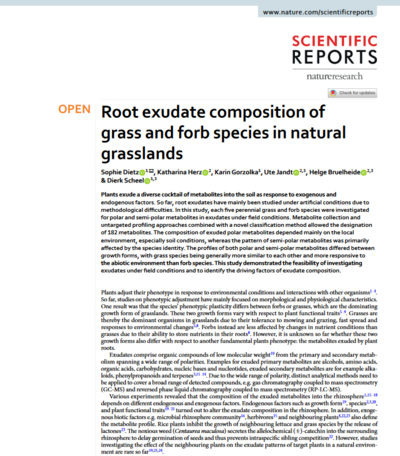Root exudates under field conditions.
Researchers from the IPB and German Centre for Integrative Biodiversity Research (iDiv) recently published a study on root exudate composition of grass and forb species in natural grasslands. Plants exude a diverse cocktail of metabolites into the soil as response to exogenous and endogenous factors. Whereas so far, root exudates have mainly been studied under artificial conditions, the researchers have now conducted a large field experiment. They transplanted five grass and five forb species in more than 50 different grassland communities and subsequently studied the effects of different factors on the composition of root-exuded metabolites. They found, that the composition of exuded polar metabolites depended mainly on the local environment, especially soil conditions, whereas the pattern of semi-polar metabolites was primarily affected by the species identity. The profiles of both polar and semi-polar metabolites differed between growth forms, with those of grass species being generally more similar to each other and more responsive to the abiotic environment than those of forb species. With this study, the authors demonstrated that it is feasible to analyze root exudates under complex field conditions and to shed light on factors determining their composition.
Original publication:
Dietz, S., Herz, K., Gorzolka, K. et al. Root exudate composition of grass and forb species in natural grasslands. Sci Rep 10, 10691 (2020). https://doi.org/10.1038/s41598-019-54309-5


